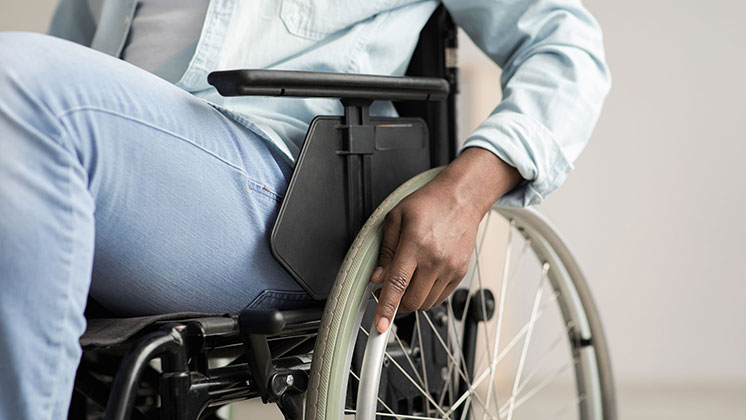Understanding Virginia Workers’ Comp Paralysis Benefits

Suffering a paralyzing injury at work is a life-altering experience, both physically and financially. For workers in Virginia who find themselves in this difficult situation, it’s crucial to understand the workers’ compensation benefits for paralysis.
This guide will walk you through what you need to know about Virginia workers’ comp paralysis benefits, from eligibility requirements to compensation amounts to the claims process and beyond. Don’t hesitate to speak to us at Slominski if you need legal assistance in your specific case.
What Qualifies as Paralysis Under Virginia Workers’ Compensation Law?
Total paralysis is when you’ve lost control of all muscles in a damaged body area – for instance, in an arm or a leg. By contrast, partial paralysis means you still have some muscle function in that body part, albeit limited.
In Virginia, total paralysis is considered a permanent and total disability, and may be compensable with lifetime benefits. The Virginia Workers’ Compensation Act states that the Virginia Workers’ Compensation Commission will look at medical evidence to determine whether an employee has total paralysis.
Some examples of total paralysis are:
- Quadriplegia – paralysis of all four limbs
- Paraplegia – paralysis of the lower half of the body
- Hemiplegia – paralysis on one side of the body.
For the condition to qualify as “permanent and total disability” in Virginia, the key factors are that the paralysis must be:
- Total – Complete loss of motor function and sensation in the affected areas
- Permanent – Not expected to improve with further medical treatment
- Work-related – Directly caused by a workplace accident or occupational disease.
Partial paralysis or temporary paralysis may still qualify for other workers’ comp benefits, but not necessarily lifetime benefits. The Virginia Workers’ Compensation Commission ultimately determines if an injury meets the criteria for paralysis based on medical evidence.
What Benefits are Available for Paralysis Under Virginia Workers’ Comp?
Workers who suffer paralyzing injuries that qualify as permanent and total disabilities are eligible for the following benefits in Virginia:
Lifetime Wage Replacement Benefits
- Weekly amount paid will be 66 2/3% of the worker’s pre-injury average weekly wage
- Subject to the state’s maximum weekly benefit amount ($1,410 as of July 1, 2024)
- Subject to annual cost-of-living adjustments
- Paid for the lifetime of the injured worker.
Lifetime Medical Benefits
- All reasonable and necessary medical treatment related to the work injury
- Including hospitalizations, surgeries, medications, medical equipment, home health care, and the like
- Available for the lifetime of the injured worker.
Vocational Rehabilitation
- These include job retraining and placement services to help the worker return to suitable employment if possible.
Death Benefits
- If the worker dies as a result of the paralyzing injury, death benefits may be available to dependents.
The lifetime nature of these benefits for paralysis cases sets them apart from most other workers’ compensation claims, which are typically capped at 500 weeks of benefits. This recognizes the catastrophic and permanent nature of paralyzing injuries.
Note that these benefits are tax-free at the federal and state level. An experienced workers’ comp attorney can help ensure your average weekly wage is calculated correctly and that you receive the maximum benefits you’re entitled to.
How Do You Qualify for Paralysis Benefits in Virginia?
To be eligible for paralysis benefits under Virginia workers’ compensation, you must meet all of these criteria:
- Be an employee covered under the Virginia Workers’ Compensation Act
- Suffer a work-related injury or occupational disease that results in paralysis
- Provide medical evidence that the paralysis is total and permanent
- File a claim with the Virginia Workers’ Compensation Commission within the required time limits.
Let’s break down each of these requirements in more detail:
Covered Employee
Most workers in Virginia are covered under workers’ compensation, including:
- Full-time employees
- Part-time employees
- Seasonal and temporary employees
- Minors
- Undocumented workers
Some exceptions exist for:
- Independent contractors (though misclassification is common)
- Federal employees (covered under federal workers’ comp)
- Railroad workers (covered by a different law called FELA)
- Domestic workers
- Certain agricultural workers.
Work-Related Injury or Disease
The paralysis must be directly caused by either:
- A specific workplace accident, such as a fall or a machinery accident
- A provable occupational disease, such as toxic exposure at work leading to neurological damage.
Injuries that occur outside of work or are not related to job duties are not covered.
Medical Evidence of Total and Permanent Paralysis
You must provide medical records and testimony from qualified physicians documenting:
- The extent and permanence of the paralysis
- That it was caused by the work-related injury or disease
- That you have reached maximum medical improvement, meaning your condition is not likely to improve from here on out.
Timely Claim Filing
You must notify your employer of the injury within 30 days and file a claim with the Virginia Workers’ Compensation Commission within:
- Two years of the date of injury for accidents
- Two years from the date of diagnosis for occupational diseases
- Five years from the last exposure for certain diseases with long latency periods.
Missing these deadlines can result in your claim being barred, so it’s crucial to act quickly.
What is the Process for Filing a Paralysis Claim in Virginia?
If you’ve suffered a paralyzing injury at work in Virginia, here are the key steps in the claims process:
- Seek immediate medical attention and notify your employer of the injury as soon as possible.
- File a claim with the Virginia Workers’ Compensation Commission using Form 5 (available on their website) within two years of the injury date.
- Your employer’s workers’ comp insurance carrier will investigate the claim and either accept or deny it.
- If accepted, you’ll begin receiving medical treatment and wage loss benefits.
- As you reach maximum medical improvement, your doctors will assess the extent and permanence of your paralysis.
- You may need to attend an independent medical examination requested by the insurance company.
- The Commission will review all medical evidence to determine if you qualify for permanent total disability benefits for paralysis.
- If approved, you’ll begin receiving lifetime benefits. If denied, you have the right to request a hearing before the Commission.
- An evidentiary hearing will be held where both sides can present evidence and testimony.
- The Commission will issue a written decision, which can be appealed if necessary.
Throughout this process, it’s highly advisable to work with an attorney who is experienced in workers’ compensation in Virginia and understands the complexities of paralysis claims. They can help ensure you meet all deadlines, gather strong medical evidence, and fight for the full benefits you deserve.
What Challenges Might You Face When Seeking Paralysis Benefits?
While Virginia workers’ compensation law provides strong protections for workers who suffer paralyzing injuries, a worker may still encounter some challenges when pursuing a claim:
Disputes Over Causation
The insurance company may try to argue that your paralysis was not caused by a work-related injury, but rather by a pre-existing condition or non-work accident. It’s absolutely crucial to have strong medical evidence linking the paralysis to your workplace injury.
Questions About the Extent of Paralysis
There may be disagreements about whether your paralysis is truly “total” or if there is potential for improvement with further treatment. Multiple medical opinions are often needed.
Vocational Rehabilitation Pressure
Even with severe paralysis, the insurance company may push for vocational rehabilitation to see if you can return to some type of work. This must be handled carefully to protect your benefits.
Delays in Benefit Payments
Administrative delays or disputes can sometimes hold up benefit payments, creating financial hardship. An attorney can help push for timely payments.
Inadequate Home Care Coverage
Ensuring you receive sufficient home health care and medical equipment can sometimes be a battle with the insurance company.
Future Medical Treatment Denials
As your medical needs evolve over time, you may face denials for certain treatments or equipment that the insurer deems unnecessary.
Attempts to Settle for Less
The insurance company may offer a lump-sum settlement that seems large but doesn’t adequately cover lifetime needs.
An experienced workers’ compensation lawyer can help you navigate these challenges and fight for the full benefits you’re entitled to under Virginia law. In paralysis cases involving potential lifetime benefits, having strong legal representation is especially important.
What Rights Do You Have as a Paralyzed Worker in Virginia?
Under Virginia workers’ compensation law, workers who suffer paralyzing injuries have important rights, including:
- The right to lifetime medical treatment for your work-related injury
- The right to choose your treating physician from a panel provided by your employer
- The right to wage replacement benefits for as long as you remain disabled
- The right to vocational rehabilitation services if you’re able to return to some type of work
- The right to have an attorney represent you in your workers’ comp claim
- The right to request a hearing if your claim is denied or benefits are terminated
- The right to appeal unfavorable decisions by the Workers’ Compensation Commission
- The right to protection from retaliation or discrimination for filing a workers’ comp claim
- The right to have your job protected while you’re on leave for up to six months
- The right to receive all communications about your claim in your preferred language.
Throughout the claims process, insurance companies may dispute your rights and entitlements. Work with a trusted workers’ compensation attorney to help protect what you’re entitled to under the law.
How Can Slominski Law Help with Your Paralysis Claim?
Navigating a workers’ compensation claim for paralysis in Virginia can be complex and overwhelming, especially when you’re dealing with such a life-changing injury. That’s where Slominski Law comes in. Attorney Jaleh Slominski has extensive experience handling complex workers’ compensation cases, including those involving permanent and total disabilities like paralysis.
Here’s how Jaleh Slominski can assist with your paralysis claim:
- Provide a free initial consultation to evaluate your case and explain your rights
- Calculate the full value of your claim, including lifetime wage replacement and medical benefits
- Ensure all claim forms are filed correctly and within required deadlines
- Gather and present strong medical evidence to support your paralysis diagnosis
- Coordinate with healthcare providers and vocational experts to support your claim
- Negotiate with the insurance company on your behalf
- Handle communications with the insurance company, allowing you to focus on your recovery
- Advise you on any settlement offers to ensure they adequately cover your needs
- Represent you at hearings before the Virginia Workers’ Compensation Commission if necessary
- Appeal unfavorable decisions to protect your right to benefits.
With Jaleh Slominski’s three decades of experience in Virginia workers’ compensation law, you can be confident that your claim is in good hands. She understands the life-changing nature of paralyzing injuries and is committed to fighting for the full benefits you deserve.
If you’ve suffered a paralyzing injury at work in Virginia, don’t hesitate to reach out to Slominski Law for help. Call (434) 205-9894 (Slominski Law Lynchburg office) or (540) 307-8478 (Slominski Law Roanoke office) to schedule your free consultation today.
Frequently Asked Questions About Virginia Workers Comp Paralysis Benefits
How long do workers’ compensation benefits last for paralysis in Virginia?
For total paralysis cases in Virginia, workers’ compensation benefits can last for the lifetime of the injured worker. This includes both wage replacement benefits and medical benefits. Unlike most workers’ comp claims which are capped at 500 weeks of benefits, total paralysis is considered a permanent and total disability that qualifies for lifetime benefits.
The reasoning behind this is that paralysis typically results in a permanent loss of earning capacity and ongoing medical needs that will last throughout the worker’s life. The Virginia Workers’ Compensation Act recognizes the catastrophic nature of these injuries and provides lifetime benefits to ensure the injured worker has financial support and medical care for as long as they need it.
It’s important to note that to qualify for lifetime benefits, the paralysis must be total and permanent, as determined by the Virginia Workers’ Compensation Commission based on medical evidence. Partial paralysis or temporary paralysis may not qualify for lifetime benefits, though they may still be eligible for other types of workers’ comp benefits.
Even with lifetime benefits, there may be periodic reviews of your medical condition to ensure you still meet the criteria for permanent and total disability. Working with an experienced workers’ compensation attorney can help protect your right to ongoing benefits.
Can I receive Social Security Disability benefits in addition to workers’ comp for paralysis?
Yes, it is possible to receive both workers’ compensation benefits and Social Security Disability Insurance (SSDI) benefits for paralysis in Virginia. However, there are some important considerations:
- Offset: If you receive both workers’ comp and SSDI, there may be an offset applied. The combined amount of your workers’ comp and SSDI benefits cannot exceed 80% of your pre-injury average earnings. If it does, your SSDI benefit will typically be reduced to bring the total within 80%.
- Qualification: To qualify for SSDI, you must meet the Social Security Administration’s definition of disability, which is different from that in workers’ comp.
- Application process: You’ll need to apply for SSDI separately from your workers’ comp claim. The application process can be lengthy and complex, often requiring medical evidence and documentation of your work history.
- Medicare eligibility: If you’re approved for SSDI, you become eligible for Medicare after a 24-month waiting period. This can provide additional medical coverage on top of your workers’ comp medical benefits.
- Legal assistance: Coordinating workers’ comp and SSDI benefits can be complex. An attorney experienced in both systems can help maximize your total benefits and ensure you’re not inadvertently jeopardizing one benefit by receiving the other.
- Settlement considerations: If you’re considering settling your workers’ comp claim, it’s crucial to consider how this might affect your SSDI benefits. Proper structuring of a settlement can help minimize the impact on SSDI.
While receiving both workers’ comp and SSDI can provide more comprehensive financial support, navigating both systems simultaneously can be challenging. Consult with an attorney who understands both workers’ compensation and Social Security disability law to ensure you’re maximizing your benefits while staying compliant with all rules and regulations.
What home modifications are covered by workers’ comp for paralysis in Virginia?
In Virginia, workers’ compensation insurance is required to cover reasonable and necessary home modifications for workers who have suffered paralyzing injuries. These modifications are intended to help the injured worker live as independently as possible and accommodate their new physical limitations. Some common home modifications that may be covered include:
- Wheelchair ramps: Installation of ramps to allow wheelchair access to the home
- Doorway widening: Expanding doorways to accommodate wheelchair passage
- Bathroom modifications: This may include installing roll-in showers, grab bars, raised toilets, and lowered sinks
- Kitchen adaptations: Lowering countertops, installing pull-out shelves, and modifying appliances for easier access
- Stairlifts or elevators: Often necessary if the paralyzed worker lives in a multi-story home
- Bed lifts: Mechanical lifts to help transfer from bed to wheelchair
- Smart home technology: Voice-activated systems to control lighting, temperature, and other home functions
- Flooring changes: Replacing carpet with hardwood or tile for easier wheelchair movement
- Accessible storage: Lowered closet rods and shelving units
- Vehicle modifications: While not a home modification, adapted vehicles for driving or passenger use are often covered.
The key factors in determining what modifications will be covered are:
- Total cost: The aggregate cost of home and/or car modifications must not exceed $42,000.
- Medical Necessity: The modification must be prescribed by a treating physician as necessary due to the work-related injury.
- Reasonableness: The cost of the modification should be reasonable in relation to its benefit.
Protect Your Rights After a Paralyzing Work Injury. Contact Us at Slominski Law.
While Virginia workers’ compensation law provides important benefits for workers who suffer paralysis on the job, navigating the claims process can be complex and challenging. In addition, insurance companies may try to minimize or deny your benefits, dispute the extent of your paralysis, or pressure you into inadequate settlements.
Having experienced legal representation is so important for paralysis claims. If you or a loved one has suffered a paralyzing injury at work in Virginia, reach out to Slominski Law today for a free consultation.
Attorney Jaleh Slominski has over 30 years’ experience with complex workers’ compensation cases, including those involving permanent and total disabilities like paralysis. She can evaluate your case, explain your rights, and fight to ensure you receive the full benefits and support you’re entitled to under Virginia law.
Call (434) 205-9894 (Slominski Law Lynchburg office) or (540) 307-8478 (Slominski Law Roanoke office) to schedule your free case review. Don’t let insurance companies deny you the compensation you deserve – get Jaleh Slominski on your side today.





